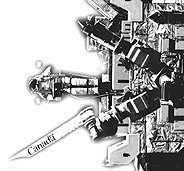on campus
Of course: Don't shoot the weather forecaster

ILLUSTRATION: TZIGANE
The course titled "Introduction to Atmospheric Science" could have been subtitled: "Don't shoot the weather forecaster."
What atmospheric and oceanic sciences professor John Gyakum wants for his class of 70 non-science students is for them to develop "an appreciation of the forecasting process and an understanding of why the process is inherently probabilistic."
It just so happens, he explains, that the very nature of storms, tornadoes and hurricanes is that of sudden change, making prediction a problem.
"We cannot predict the precise location of where a tornado will strike a day in advance — or even when it will strike — but we can often predict whether the conditions will be favourable for a tornado to develop."
In weather forecasting, there are many factors involved.
The conditions characterizing the ice storm of two years ago, for instance, were not so different from five other "analogues" (similar periods of weather) Gyakum has looked at over the past 30 years. "What made that storm significant," he says, "was its longevity, its intensity."
Using such examples of current and recent weather to illustrate his points, Gyakum teaches his students why, for instance, a high-pressure system produces the sort of cold weather we had last week. "That bitter cold was due to an Arctic anticyclone, a cold high pressure system from higher latitudes which advects in a lot of cold air — which is common in winter though we haven't had many in recent years."
Topics such as the composition of the atmosphere, cloud development, wind, "planetary scale circulation," such as the El Nino phenomenon, and the effect of air pollution on weather are touched upon and Gyakum provides references to web sites for students interested in going into greater depth.
First-year student Ramnath Ravi opted to take this course because he is "intrigued by the weather reports and wanted to find out the meaning of low and high pressure systems."
Books4sale...on line

| |
Finding the bargains in second-hand textbooks used to involve an arduous search of bulletin boards, used books stores and the like.
Not any more. Now the used textbook marketplace is a click of the mouse away by entering www.books4exchange.com.
Initiated last year by the Science Undergraduates' Society, the web site has grown from being strictly McGill students selling strictly science and management texts, to include arts and engineering at McGill, as well as Champlain College, Glendon College (York University) and the University of Saskatewan.
Why include CEGEPs on the site? Manish Srivastava, who came up with the idea for the site last year when he was vice-president academic of the SUS, realized that many textbooks used in CEGEPs are also used at the university level. "The physics text I used at CEGEP is the same as the one used at McGill and Concordia," says the one-time science student who is now in his second year of economics.
Srivastava, who is business manager of the site, expects that by the end of August, when the site will be relaunched, there will be 70 to 100 more schools signed up, including UQAM and Concordia University. He also plans to have the site upgraded so that a buyer, after entering the titles sought, may be alerted by e-mail when the title comes up for sale. There is no cost involved for a college or university. All that is needed is a list of the courses in question.
"It's basically one big match-making agency," says Srivastava.
Besides being a convenient way to shop, buying second-hand books through this service allows for easy price-comparison. One current seller is asking $75 for a first edition of Chemistry: The molecular nature of matter and change, while another is asking $35!
The SUS runs books4exchange with Toronto-based EDge Interactive Publishing Inc. who does the web site programming, free of charge, in order to increase the traffic on its other student-oriented web sites, such as schoolfinder.com and scholarshipscanada.com.
Always be prepared

| |
Remember that scene in The World According to Garp, where Garp finally has an opportunity to get hot and heavy with the lass he's had a crush on for years, only to discover that he's not properly equipped for the encounter?
"No glove, no love," says the gal.
The McGill Women's Union is doing its part to ensure that the Garps of the world have no excuse not to be prepared for good fortune.
The student group, located in room 418 of the University Centre on McTavish, sells condoms at the dirt cheap price of four for a buck. The group, in a bid to promote close encounters of the safest kind, also sells dental dams and gloves for "all kinds of safe lovin'."
And, says the group's web site, "For those of you who unexpectedly need a tampon or a pad, fear not — we sell them and pain-reliever for 25 cents each."
Beer and billiards

| |
Attention McGill managers. Looking for a civilized way to unwind after a hard day's work?
Management Forum may have just the tonic you're looking for.
Today, between 4 pm and 6:30 pm, managers are invited to attend a Happy Hour event taking place in the Faculty Club's newly renovated Billiard Room on the third floor.
The room now has a fully equipped cash bar and a bartender will be on hand should you wish to purchase some refreshments (soft drinks $2.75, beer $4.50, wine $5.25, mixed drinks $6). If you plan to attend, please RSVP (anne@eps.mcgill.ca).
To infinity and beyond

| |
NASA might still be licking its wounds over its embarrassment about losing track of the $125-million Mars Climate Orbiter last year, but it can take some solace in the news that an ambitious group of young people is determined to drum up enthusiasm for the exploration of space.
The Association for the Development of Aerospace Medicine is a new student group that began with a handful of members last fall and now boasts a membership of about 150, according to dentistry student Carol Chahine, one of ADAM's founders.
The group's origins date back to the Third United Nations conference on the Exploration and Peaceful Uses of Outer Space (UNISPACE III), which took place in Vienna last July.
The UN conference included, for the first time, a related youth conference that involved 160 young delegates from 60 countries. The selection process for youth delegates was tough, recalls Chahine, who was one of nine Canadians selected. She was chosen on the basis of an essay detailing her interest in space, as well as by creating a 25- by 30-inch space-themed wooden puzzle painted in acrylic.
Together with fellow delegates Marlene Grenon, a McGill medical student, and Rachel Zimmerman, a space vision system engineer with the Canadian Space Agency, Chahine set up ADAM upon returning to Montreal.
So far the group has organized events featuring a number of space experts, including McGill scientists Doug Watt (one of the world's top experts on the effects of weightlessness on the human body) and Hojatollah Vali (part of the NASA team that identified a Martian meteorite as possibly containing evidence that life once existed on that planet).
Chahine says ADAM is looking into setting up chapters in Toronto and Melbourne. The group also encourages younger people to get interested in space.
"We went to the Montreal Children's Hospital and spent time with the kids in the ER and the wards, talking to them about space and making huge rockets with them," says Chahine.
On February 16, Pat Sullivan, from the Canadian Space Agency's Operational Space Medicine group will speak about "Decompression Sickness" in Room 107-108 of the University Centre at 8 pm.
Les comtesses d'Hoffmann
A quick look at the production and directorial line-up for Opera McGill's Les Contes d'Hoffmann reveals five women playing leading roles in putting together the show. Is such a concentration of women unusual? "Very," says director of opera studies Dixie Ross-Neill, with a laugh. "I think we're starting off 2000 right.
"It's unusual to have a lady stage-director," says Ross-Neill. "And this is the first time that I know of that we've had a lady conductor."
Tania Miller, a native of Saskatchewan and conductor of Michigan Opera Works, guest-conducted the McGill Orchestra last fall and was invited back to conduct the opera orchestra when the original conductor, David Agler, hurt his arm.
That New York-based stage director Sue Lawless was invited to be this year's stage-director was also the work of serendipity. Lawless directed Ross-Neill's son, Ross Neill, eight years ago in musical theatre, and the singer mentioned her to his mother and father, Bill Neill, chair of voice performance at the Faculty of Music. They invited her to guest -teach and direct and she accepted.
"The biggest challenge was the sheer amount of people," said Lawless over the phone in between rehearsals. There are two casts of 21 people, plus the chorus and orchestra, she notes. Furthermore, given Lawless's naturalistic (à la Stanislavsky) approach to acting, whereby each player finds his or her way of interpreting a part, each cast performs a somewhat different production of the opera and each cast had to be rehearsed separately to avoid influencing one another.
The other key backroom women in the opera are costume designer Mireille Vachon, who designed and oversaw the production of more than 80 period costumes for the 19th century opera, and production co-ordinator Louise Ostiguy, an administrative assistant at the faculty.
The opera continues tonight until Jan. 30, Pollack Hall, 7:30 pm. Tickets are $21.25 or $12 for students and seniors. Phone 398-4547.

